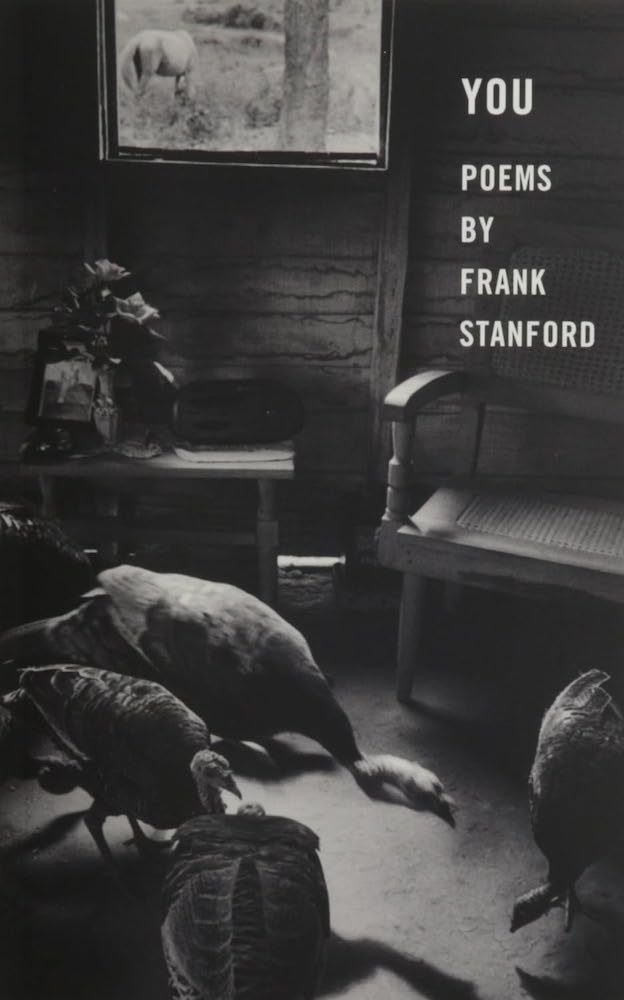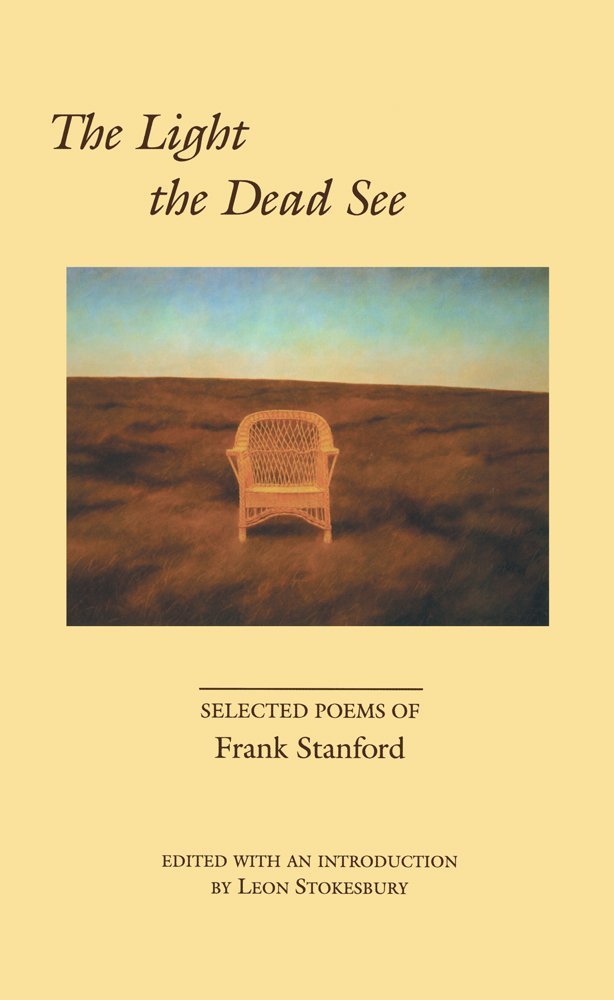
You.
Frank Stanford.
Lost Roads Publishers, 1979, 2008.
978-0-9187865-6-2

Hidden Water: From the Frank Stanford Archives.
Michael Wiegers & Chet Weise, eds.
Third Man Books, 2015.
978-0-9913361-3-5

The Light the Dead See: Selected Poems of Frank Stanford.
Leon Stokesbury, ed.
University of Arkansas Press, 1991.
1-55728-193-9
They say you die three times. Once when your heart stops. Again when they put you in the ground. And then a final time when there’s no one left on earth to say your name.
*
Chinamen. Injuns. The plural N-word. Does diction alone disqualify, cancel genius in 2023? This by a man who shot himself three times through the heart on his way out. Triggering indeed.
*
At the Brigham Young University Bookstore, my mentor’s first collection of stories, A Woman Packing a Pistol, was for sale, but you had to ask the manager for it. The thing was kept behind a counter, and when you paid for it, they handed it to you sleeved in a brown paper sack. That’s how we’d pass it around to one another, my cohort and I drunk on the hooch of my mentor’s words. I don’t remember much of Darrell Spencer’s debut published by Dragon Gate (defunct for decades now), but I remember a woman twisting sprinkled donuts on her titties like makeshift pasties. Samizdat.
*
This summer, a copy of You turned up on the used poetry cart at the Strand Bookstore. Six bucks for a slim volume. Clocking in at exactly 48 pages including front and back matter, the thing read more like a chapbook than a book-book even if it made the minimum of three “signatures” (16-page bundles in printing parlance). The first posthumous book from Lost Roads in 1979 after Stanford’s suicide, this second printing had a pub date of 2008, almost three decades later, with a printed cover price of $15. Six bucks felt like a steal! Still, I sat right down on the floor between towering shelves of steel and read the thing straight through first. Ever done that in the dusty stacks of a library or holed up in some corner of a used bookstore faintly reeking of mildew and cat piss?
Ever feel like you can’t believe what you’re reading cuz it’s so good? Words you’ve never seen put together by anyone else casting their dark spell:
Nights and days floated
Over the whorehouse
Like webs on the lake,
A monastery
Full of noise and girls
(from “Instead” p. 24)
She is dizzy from the light
Swimming through the reeds
Like shadows of minnows.
She is sad from sipping the flat beer
Of her own voice.
(from “Epiphanies” p. 40)
Verbs and nouns are the engines driving these poems stripped down to their bare-ass strangeness where “there is sadness in bed for twenty centuries / And everyone is chewing grass on the graves again.”
(from “Circle of Lorca” p. 11).
Stanford’s posthumous shadow seeps into all the proceedings, not only because of the suicide and his indelible means, but also that he died just a little after missing admission into the 27 Club (Janis Joplin, Jim Morrison, Jimi Hendrix, Kurt Cobain, Amy Winehouse). What else all these voices might have produced with their talent and genius, we will never know. Keats. Plath.
*
Ever carry around a stack of books in a used bookstore only to put them back, one by one, onto the shelves where you first found them?— the ambitious appetite of our roving eyes checked by our actual bank accounts, the towers of books already erupting from every available square inch of floorspace in our abodes groaning under the weight of “No more!”
Our feelings never quite fit the forms, as my therapist liked to say.
Carrying around a stack of books like that feels like greed, a hambone too big for a loon-dawg’s jaws, desire and hunger at its most aspirational. By the time I was six feet off the Strand linoleum on a stainless steel ladder, You was the only volume that remained in my clutches. I was determined to plant this one on my nightstand when I got home, let its wild verses seep into my dreams.
And what was I doing high up on a wobbly ladder under ugly bars of fluorescence? Looking for a possible mate.
*
As it happened, I got lucky. Stumbled across two pristine copies of Hidden Water: From the Frank Stanford Archives. And from the almost empty back cover, I read:
Lord, he had a way with him: His eyelids were like louvered shutters.
When he looked at your face, he looked at your face.
(from “The Lacuna.”)
Sho nuff, there he was on the front cover, his nakedness wrapped in a hand-sewn quilt with his icy blues capturing my gaze while a black panther sat under a full moon next to our shaman, looking off into the distance. The Strand had knocked five bucks off the $17.95 cover price, another steal. I would soon discover that the cover image had been painted by the poet’s widow, Ginny Stanford, who along with the poet C. D. Wright, became trustees for Stanford’s Estate. They were both present in the kitchen of the house when three shots rang out from Stanford’s bedroom, this on the very day Ginny found out about the ongoing affair between Stanford and Wright. A trifecta.
*
That day at the Strand, there were no used copies of What About This: The Collected Poems of Frank Stanford nor Stanford’s epic of 15,283 lines, The Battlefield in Which the Moon Says I Love You, the first printing from 1978 long out of print, and the 2000 reprint (both from Lost Roads, the press Stanford and Wright founded) thankfully easier now to track down online. That hardly mattered as both titles were already sitting on my shelves back home (though never fully digested, only nibbled on). What mattered was to chance upon what else I never quite knew existed. To score something new.
*
More than half of the books I own, I have not read.
When I turned 50, I decided to read Proust’s 3000+ page magnum opus in the Moncrieff translation. It took me about 18 months. It was worth the wait, though what I had been waiting for all those decades, I can hardly say.
I have never read the Aeneid. Never made it through the Divine Comedy (let alone the Inferno!). I like the feel of Ashbery’s Flowchart in my hands but have no intention of slogging through it. This past year, I did read the Oddysey four times all the way through in two translations (the Robert Fagles and the Emily Wilson). Why read this book and not that book remains a mystery.
Roland Barthes once said, “A classic is a book everyone has heard about but no one has read.”
Something like that.
*
Here’s how The Battlefield in Which the Moon Says I Love You came into my life. At the start of grad school in 1989 in Houston, I met Robin Reagler in my cohort. Queer and fresh from the Iowa Writer’s Workshop, she seemed to me wisdom’s very font! At some point, she mentioned The Battlefield. This was in the days before the internet and sites like www.bookfinder.com. Those were the days you carried a title around in your head like a missing Grail as you roamed from bookstore to bookstore across country, a time when kifing a volume from a university library was sometimes the only recourse, “borrowing” a book for a long stretch till an actual copy could be found/had/owned.
Fast forward seven years, and I woke up one morning in Providence at the home of Forrest Gander and C. D. Wright and Lost Roads Press. At breakfast, I mentioned how impossible it was to track down a copy of Battlefield over the many years since grad school! C. D. said to me, “Be right back.” When she returned from the cellar, she was holding a slightly yellowed and warped (and not quite waterlogged) copy of the book and asked if I wanted it. It had been used for a doorstop.
*
I have lived in towns where marathon readings of Battlefield were given. I have admired the fervor and devotion but could never bring myself to go.
The thing is: I’m not sure I’ve ever been able to read more than a single page of Battlefield in a single sitting. The richness reminds me of not wanting to eat an entire Dove Bar, throw some of it out. Or make the thing last as long as possible.
If I read one page a day, it would take me 1.48+ years.
If I read one page a week, it would take me 10+ years.
Maybe Stanford dying so young makes me want to never finish?
Stanford is buried in St Benedict’s Cemetery in Subiaco, AK. I read somewhere online that his tombstone reads:
Frank Stanford, Poet
It wasn’t a dream, it was a flood.
*
Hidden Water: From the Frank Stanford Archives is a compendium, a kitchen sink of a book edited by Michael Wiegers and Chet Weise. This joint publishing venture between Third Man Books (Nashville) and Copper Canyon Press is a 200-page culling of rare treasures and ephemera from the Beinecke Rare Book and Manuscript Library donated to the collection by the Estate of Frank Stanford.
If one doesn’t know Stanford’s work, is this volume a good place to start or is it better to end up here only after long last?
The book’s frontispiece includes a detachable perforated bookmark of the poem “Stars”:
Slices of
cold butter
the lovers
are spreading
Over their
toast.
Stanford’s genius is everywhere apparent. One can dive in almost anywhere and pull up pearl after pearl:
I don’t have flat feet
Or a new barn to hide death in
My rump isn’t unclean
Like the bottom of a swamped boat
I have enough credit to buy shirts
But I still wonder
(from “Blue Yodel in Paradise”)
*
One can try to collect all nine of Stanford’s books. By my count, it would run one upwards of 10K if you want to include first printings from Mill Mountain Press and Lost Roads Press. Here are the titles one can recite like a mantra, a rosary:
The Singing Knives (1971)
Ladies from Hell (1974)
Shade (1975)
Field Talk (1975)
Arkansas Bench Stone (1975)
Constant Stranger (1976)
The Battlefield Where the Moon Says I Love You: A Poem (1977)
Crib Death (1978)
You (1979)
*
The first book I ever bought by Frank Stanford was The Light the Dead See: The Selected Poems of Frank Stanford, a relatively slim volume edited by Leon Stokesbury and published by the University of Arkansas Press in 1991, more than a decade after Stanford’s death and right smack in the middle of grad school hijinks when I worked three jobs, buying poetry at the Brazos Bookstore being my favorite calling. For many of us, The Light the Dead See was a crash course, a primer, a sampler culled from all nine of the aforementioned orphans plus a half dozen previously unpublished poems. Can’t think of a better way to drop twenty hard-earned bucks. That is, if you don’t want to lug around a tome. Otherwise, for twice the price and more than nice, the no-brainer would be What About This: Collected Poems of Frank Stanford. A fine doorstop of a book that one can prop up in one’s cellar, awaiting the right moment that just might change someone’s life.
*
My mentor Richard Howard once said to me: “Every poet, no matter how famous or celebrated, enters a literary limbo upon death, awaiting to be resurrected by readers who never knew them while they were alive. Most are never revived.”
Ladies (and Gentlemen) in Hell: Mr. Frank Stanford.

